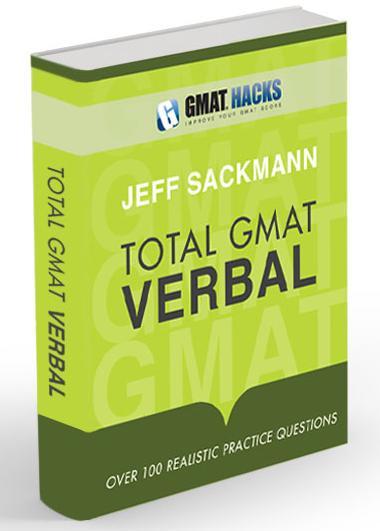
Bookshelf
|
|
Total GMAT Math Jeff's complete Quant guide, on sale now! |
|
|
Total GMAT Verbal Everything you need to ace GMAT Verbal! |
1,800 Practice Math Questions
Buy Jeff's books at Amazon.com

GMAT Official Guide, with IR
OG Math | OG Verbal
OG12 & Quant Rev solutions!
GMAT Question of the Day
Beginner's Guide to the GMAT
GMAT Hacks Affiliate Program

Recent Hacks

Categories
- General Study Tips
- Goals and Planning
- CAT Strategy
- The Mental Game
- GMAT Math Strategy
- GMAT Math Topics
- Mental Math
- Data Sufficiency
- Critical Reasoning
- Reading Comprehension
- Sentence Correction
- Analytical Writing Assessment
- Integrated Reasoning
- IR Explained
- Business School Admissions
- GMAT Prep Resources
- Practice Questions
- Total GMAT Math
- Total GMAT Verbal
- GMAT 111

How Not To Handle a Low GMAT Score
| You should follow me on Twitter. While you're at it, take a moment to subscribe to GMAT Hacks via RSS or Email. |
A BusinessWeek.com article published earlier this week addresses the topic of how to handle application "blemishes"--things that you can't hide, but would rather not discuss.
I'm not an admissions consultant, so there are better resources if you got kicked out of your first undergraduate institution or have a misdemeanor in your past. But there is one GMAT-related word of caution I should share.
Bad GMAT Experiences
A huge number of MBA applicants aren't happy with their GMAT score. That's no surprise--it's a tough test, and tens of thousands of people are aiming for the 90th percentile. Where the problem arises is when people start to blame the test or the test center.
I've been teaching standardized tests for nearly a decade, and in that time, I've heard every story you can imagine. Every flavor of crippling test anxiety; every possible in-test distraction; every bit of unpredictable test content.
I've heard them all, and so have admissions officers.
The article I linked above suggests that, for some blemishes, you use an optional essay to acknowledge the issue and discuss how you've moved past it. Again, I'm not an admissions consultant, but to me, that sounds like good advice.
However, don't use that essay to "explain" your GMAT score. Just don't.
GMAT Excuses
If you come home from the test with a 570 instead of the 670 you were hoping for, you may be tempted to tell the admissions committee why you "deserved" a better score. Certainly that's easier than studying harder and taking the test again. But again, they've heard that story before.
Part of the challenge of the GMAT is performing under pressure. There's no excuse for not knowing what's on the test. There's no excuse for wilting under the pressure of a standardized test. After all, business schools aren't exactly pressure-free themselves.
If you use an optional essay to explain your GMAT score, or otherwise try to plead that you deserved a better score, you'll sound like you're whining. Any circumstance or personal issue you dream up won't be unique to you. Instead, it will make you sound like someone who can't get the job done him- or herself and is looking for a favor to make up for it.
If you were running a business school, would you admit that kind of person?
About the author: Jeff Sackmann has written many GMAT preparation books, including the popular Total GMAT Math, Total GMAT Verbal, and GMAT 111. He has also created explanations for problems in The Official Guide, as well as 1,800 practice GMAT math questions.
 |
Total GMAT Verbal
The comprehensive guide to the GMAT Verbal section. Recognize, dissect, and master every question type
you'll face on the test. Everything you need, all in one place, including 100+ realistic practice questions. |